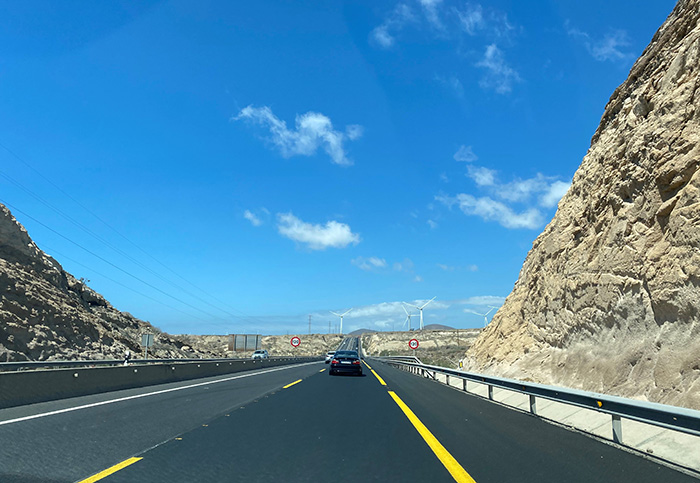The Canary Islands, as a fragmented territory, and due to its orographic characteristics, have limitations getting access to raw materials to execute great construction works. Sand and gravel are some of the basic materials with difficulties of supply in the islands. Tenerife, for instance, has just one quarry to extract these materials.
At Sacyr, in line with our sustainability and innovation policy, we have found the best solution for the Canary Islands quarry overuse problem. A process based on using recycled sand and gravel obtained from the roads to recondition.
The Cabildo de Tenerife (The Council of Tenerife) has shown its concern about this matter and has looked for more sustainable, alternative works. On this basis, the Council awarded this contract to Sacyr Engineering and Infrastructures to recondition several segments of the TF-1 and TF-5 roadways through processes that employ as much recycled material as possible and thus, avoiding using new construction material.
50% of recycled materials
This is the first road maintenance project in Spain that uses asphalt mixtures with 50% of milled material obtained from the very same maintained road; a true example of circular economy and environmental impact reduction.
“On the conditions of tender, we planned to expand the asphalt conglomerate from 30 to 50%. These are the first construction works to suggest recycling rates this high. Sacyr presented the best valued technical offer, hard to improve”, explains Miguel Pintor, Head of the Road and Landscape Technical Service of the Cabildo de Tenerife’s office.
“The Cabildo has been promoting sustainable environmental actions in the Canary Islands for a while. Furthermore, the processing of construction residue is also an overrun; it is another issue we are working on”, explains the islander expert.

TF-1 at the surroundings of the Arico environmental complex (Tenerife).
This rehabilitation project encompasses actions in two segments (southbound) and three segments (northbound) of the roadway.
This action is simultaneously corrective and preventative because, in addition to acting in the most damaged segments, we will also act in those that present conditions that might present a risk of collapsing.
“The reconditioning consists of milling the current pavement and replacing it with hot-mix asphalt concrete, of different degrees of thickness depending on the current state of the roadbed and the road’s deterioration. After that, we will standardize the main road axis’ width with a uniform asphalt pavement mixture, to reduce the risk of accidents caused by the accumulation of rainwater on the road”, explains José Campesino Sierra, manager of the project for the rehabilitation of the roadbed of C.I.R. TF-1 Phase III, in Tenerife.
“Thanks to this process, we can reduce by half the volume waste generated from the current roadbed’s removal, as well as the number of materials to extract from a quarry to produce the mixtures”, tells Campesino.
Additionally, the project aims to improve road safety by using speed bumps on the exterior white lane markings, which will help avoid accidents caused by distractions.
